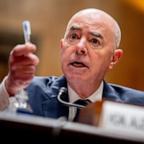Obama Tells EPA To Ditch New Ozone Regulations
Eric Cantor's jobs plan aims to block this and other EPA regulations.
September 2, 2010 -- Just days after House Majority Leader Eric Cantor announced the House would begin voting to repeal proposed air quality regulations that he said would prevent job growth, President Obama instructed the Environmental Protection Agency to withdraw its proposed ozone regulations.
"I have continued to underscore the importance of reducing regulatory burdens and regulatory uncertainty, particularly as our economy continues to recover," Obama said in a statement.
Obama said the standards are already being revised and would have to be updated again in 2013.
"Ultimately, I did not support asking state and local governments to begin implementing a new standard that will soon be reconsidered," Obama said in the statement.
In a jobs agenda memo to House Republicans, Cantor said the proposed ozone regulations would be "possibly the most harmful of all the currently anticipated Obama administration regulations" and would cost at least $1 trillion over a decade to implement. The EPA estimates that the public health benefits from the regulations could save up to $100 billion per year.
Besides small business tax breaks, Cantor's plan to ignite job growth was focused entirely on preventing new federal regulations from taking effect. All but three of the 10 regulations Cantor targeted are Environmental Protection Agency rules geared toward limiting power plant emissions.
"By pursuing a steady repeal of job-destroying regulations, we can help lift the cloud of uncertainty hanging over small and large employers alike, empowering them to hire more workers," Cantor, R-Va., wrote in the memo to House Republicans.
But EPA Administrator Lisa Jackson wrote Wednesday in a Huffington Post Op-ed that delaying the implementation of the proposed standards would "leave companies uncertain about investing" and prevent them from creating more jobs.
"Pledges to weaken or slow proposed standards, many of which have been developed over years and with industry input, prevent businesses from investing in those jobs," she wrote.
Cantor claims the regulations are "costly bureaucratic handcuffs" and will destroy millions of jobs. Under his plan the House will vote each week to roll back regulations on everything from more stringent ozone standards to coal ash emissions, a by-product of coal-burning power plants.
"There are a plethora of clean air rules that are collectively and disparagingly called the 'train wreck' by the business community," said Luke Popovich, a spokesman for the National Mining Association.
Poppvich said the EPA rules are a "double whammy" because energy producers would either have to absorb the added cost of implementing the regulations or pass the costs on to consumers.
"What is at stake is it raises the cost of doing business or raises the cost of energy and therefore depresses economic investment and depresses job creation," he said.
An EPA official, on the other hand, said the agency has been implementing regulations like these since its inception in 1970, both when the economy was booming and when it was lagging.
"The EPA's regulations have had nothing to do with the current economic recovery that we're in," the EPA official said. "We've been doing this for 40 years. The bottom line is the economy continues to grow in the United States while we continue to do environmental control in the United States."
Some scientists claim that environmental regulation does not kill jobs because stricter standards spur innovation, which in turn creates jobs.
"In 1970 the Clean Air Act put out standards for cars that were beyond the capability of the car industry in 1970," said Marchant Wentworth, the deputy legislative director for the Climate and Energy Program at the Union of Concerned Scientists. "They met those standards because those standards spurred innovation.
"This is the pattern with environmental protection in this country," Wentworth continued. "Standards and regulations have spurred innovation in the marketplace."
Wentworth said Cantor is only looking at one side of the coin because it is far easier to calculate the cost of adding new technology to comply with more strict regulations than to calculate the benefits of less pollution.
"What is harder to determine is the benefits that your grandmother may feel when she avoids her next dose of asthma attack. Those are real benefits, but they are just diffused," Wentworth said.
While Cantor writes that the proposed regulations would cost billions of dollars to implement, the EPA argues that these initial costs would be dwarfed by the health care cost savings from improved public health.
"These rules aggregately will prevent tens of thousands of premature deaths," an EPA official said. "We're talking about mercury in children, fine particle soot pollution that causes cardiovascular impacts, and respiratory impacts that can result in premature deaths."
Popovich said the mining industry is not necessarily against the regulations, but is more opposed to the quick timelines set for implementing them, which he says do not give companies enough time to develop and implement new technologies.
"Much of the concern isn't telling the EPA you have no business doing this," he said. "It is simply telling them you are going about it the wrong way."




